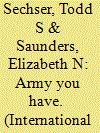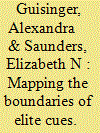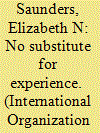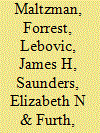|
|
|
Sort Order |
|
|
|
Items / Page
|
|
|
|
|
|
|
| Srl | Item |
| 1 |
ID:
096693


|
|
|
|
|
| Publication |
2010.
|
| Summary/Abstract |
Recent research suggests that a crucial factor in understanding the outcomes of military conflicts is the extent to which militaries are mechanized-that is, their relative dependence on tanks and armored vehicles compared to manpower. Since World War II, militaries have become increasingly mechanized both among the great powers and in unexpected quarters of the developing world. Yet the extent of military mechanization varies widely across states. Why have some states adopted highly mechanized force structures, while others have not? This paper tests several hypotheses about the determinants of military mechanization. One perspective suggests that strategic factors-including the force structures of adversaries and neighbors, recent combat lessons, and internal insurgency threats-shape a military's mix of manpower and vehicles. A second set of hypotheses points instead to domestic institutions such as democracy and civilian control of the military. Still other theories emphasize economic forces and international norms. To test these and other hypotheses, we construct a new data set containing mechanization rates for more than 150 militaries from 1979 to 2001. Broadly, we find significant support for the strategic perspective and little support for domestic institutional explanations. In addition, the results suggest systematic and predictable differences in the ways states structure their militaries in response to security pressures.
|
|
|
|
|
|
|
|
|
|
|
|
|
|
|
|
| 2 |
ID:
168951


|
|
|
|
|
| Summary/Abstract |
When and how do domestic politics influence a state's nuclear choices? Recent scholarship on nuclear security develops many domestic-political explanations for different nuclear decisions. These explanations are partly the result of two welcome trends: first, scholars have expanded the nuclear timeline, examining state behavior before and after nuclear proliferation; and second, scholars have moved beyond blunt distinctions between democracies and autocracies to more fine-grained understandings of domestic constraints. But without linkages between them, new domestic-political findings could be dismissed as a laundry list of factors that do not explain significant variation in nuclear decisions. This review essay assesses recent research on domestic politics and nuclear security, and develops a framework that illuminates when and how domestic-political mechanisms are likely to affect nuclear choices. In contrast to most previous domestic arguments, many of the newer domestic-political mechanisms posited in the literature are in some way top-down; that is, they show leaders deliberately maintaining or loosening control over nuclear choices. Two dimensions govern the extent and nature of domestic-political influence on nuclear choices: the degree of threat uncertainty and the costs and benefits to leaders of expanding the circle of domestic actors involved in a nuclear decision. The framework developed in this review essay helps make sense of several cases explored in the recent nuclear security literature. It also has implications for understanding when and how domestic-political arguments might diverge from the predictions of security-based analyses.
|
|
|
|
|
|
|
|
|
|
|
|
|
|
|
|
| 3 |
ID:
162440


|
|
|
|
|
| Summary/Abstract |
As research on leaders matures, a next step is a better understanding of the advisers who surround them. This article explores the often-hidden politics of leader–adviser interactions, focusing on how leaders strategically manage elite cues from within their own circle that could engage otherwise dormant or permissive public opinion. Advisers can serve as cue givers when leaders contemplate the use of force, but leaders can shape which cues reach the public by accommodating advisers. This article explores this argument by combining a survey experiment with a case study of the 2009 escalation in Afghanistan, illustrating how the dynamics identified in the experiment motivate the president to bargain with advisers whose support or opposition would most influence public opinion. An important implication is that in the real world, damaging cues found in survey experiments may be diminished in volume or may not reach the public, whereas helpful cues could be magnified.
|
|
|
|
|
|
|
|
|
|
|
|
|
|
|
|
| 4 |
ID:
155499


|
|
|
|
|
| Summary/Abstract |
When and how do elite messages shape mass opinion on international issues? Do informational or partisan components of elite cues dominate? Recent survey experiments offer conflicting insights. We argue that issue context matters, and that the single-issue nature of most survey experiments masks systematic variation in how elite cues affect attitudes across international issues. These effects depend on the baseline distribution of mass opinion on the issues themselves. Two characteristics of underlying opinion prove crucial: first, the share of those not aligned with expert opinion, and second, the degree of partisan polarization. Where polarization is limited, information effects should dominate. Where issues are polarized, information intake should be limited by partisan attribution. We test these hypotheses using nine survey experiments across a range of issues, including the rise of China, climate change, international institutions, and the use of force. At one extreme, all messages—even those endorsed by generic or opposition experts—can shift opinion; at the other, only partisan-attributed messages matter. Our findings are important not only for understanding public opinion about international issues but also for those interested in mobilizing opinion in a democratic setting.
|
|
|
|
|
|
|
|
|
|
|
|
|
|
|
|
| 5 |
ID:
153562


|
|
|
|
|
| Summary/Abstract |
Despite advances in the study of individuals in international relations, we still know little about how the traits and biases of individuals aggregate. Most foreign policy decisions are made in groups, usually by elites with varying degrees of experience, which can have both positive and negative psychological effects. This paper addresses the aggregation problem by exploring how the balance of foreign policy experience among leaders and advisers affects decision making in war, using a principal-agent framework that allows the relative experience of leaders and advisers to vary. A leader's experience affects decision making and, ultimately, the risks associated with conflict, through three mechanisms. First, experience influences a leader's ability to monitor advisers. Second, a leader's experience affects the credibility of delegation to experienced advisers and, in turn, the nature and extent of information gathering. Third, experience affects whether leaders are able to diversify advice, as well as their preference for policies that appear certain. I illustrate the argument using two cases that hold an unusual number of factors constant: the 1991 and 2003 Iraq Wars. George W. Bush's inexperience exacerbated the biases of his advisers, whereas his father's experience cast a long shadow over many of the same officials. Understanding the experience and biases of any one individual is insufficient—the balance of experience within a group is also important. Experience is therefore not fungible: a seasoned team cannot substitute for an experienced leader.
|
|
|
|
|
|
|
|
|
|
|
|
|
|
|
|
| 6 |
ID:
071653


|
|
|
|
|
| Publication |
2006.
|
| Summary/Abstract |
This essay addresses a prominent post-Cold War issue to which political scientists have paid relatively little attention: the status of so-called rogue states in international politics. The war in Iraq crystallized transatlantic disagreement over whether "rogue states" exist and how they should be treated, but the debate raged throughout the 1990s. This essay brings international relations theory to bear on the issue of "rogue states," but it does so with a theoretical twist. It argues that we must first identify the entity from which these states are allegedly excluded as well as who gets to set the membership criteria. If we stipulate that the international system includes all states, then international society can be defined according to various shared ideas and many realizations of international society are possible. Powerful states may try to act as "norm entrepreneurs," promoting their ideas as the basis of international society. But states, including great powers, may genuinely disagree over the basis and boundaries of this society. It is thus vital not only to take both power and shared ideas seriously, but also to describe the origins and limits of shared ideas. The limits to shared ideas can be termed "bounded intersubjectivity." This essay uses the debate over "rogue states" and the transatlantic crisis over confronting Iraq to underscore these theoretical issues
|
|
|
|
|
|
|
|
|
|
|
|
|
|
|
|
| 7 |
ID:
091425


|
|
|
|
|
| Publication |
2009.
|
| Summary/Abstract |
When and why do great powers seek to transform foreign institutions and societies through military interventions? What role does executive leadership play in influencing the choice of intervention strategy, especially the degree to which an intervention interferes in the domestic institutions of the target state? A typology of political leaders based on whether they believe that the internal characteristics of other states are the ultimate source of threats indicates that these threat perceptions shape the cost-benefit calculation leaders make when they confront intervention decisions; they also have important consequences for how states intervene. A comparison of the beliefs of President John F. Kennedy and President Lyndon B. Johnson, as well as their decision-making during the Vietnam War, illustrates how the theory operates.
|
|
|
|
|
|
|
|
|
|
|
|
|
|
|
|
| 8 |
ID:
136452


|
|
|
|
|
| Summary/Abstract |
Research transparency is an idea that is easy to love in principle. If one accepts the logic behind emerging transparency and replication standards in quantitative research, it is hard not to agree that such standards should also govern qualitative research. Yet the challenges to transparency in qualitative research, particularly on security studies topics, are formidable. This article argues that there are significant individual and collective benefits to making qualitative security studies research more transparent but that reaping these benefits requires minimizing the real and expected costs borne by individual scholars. I focus on how scholars can meet emerging standards for transparency without incurring prohibitive costs in time or resources, an important consideration if transparency is to become a norm in qualitative security studies. In short, it is possible to achieve transparency without tears, but only if perfection is not the enemy of the good.
|
|
|
|
|
|
|
|
|
|
|
|
|
|
|
|
| 9 |
ID:
162382


|
|
|
| 10 |
ID:
117571


|
|
|
|
|
| Publication |
2012.
|
| Summary/Abstract |
In this article, we use a multimethod approach to shed light on the strategic use of presidential pets. We draw on primary source materials to demonstrate that pets are an important power center in the White House. Then we turn to presidents' strategic use of their pets in public. We present a theoretical framework and statistical evidence to explore the conditions under which presidents are most likely to trot out their four-legged friends. We show that presidents carefully gauge the best and worst times to conduct a dog and pony show. In times of war or scandal, dogs are welcome public companions, but not so in periods of economic hardship.
|
|
|
|
|
|
|
|
|
|
|
|
|
|
|
|
| 11 |
ID:
141972


|
|
|
|
|
| Summary/Abstract |
Much of the literature on domestic politics and war assumes that open political debate, and especially the role of public opinion, is a key distinguishing feature of democracies in the international arena. Yet scholarship on political behavior demonstrates that the public is uninformed about foreign policy and tends to take cues from elites. This paper argues that the importance of elite cues gives democratic elites a crucial and often-overlooked role in democratic foreign policymaking. Four features of an elite audience—different preferences, concentrated power, informational advantages, and small coalition size—mean that the political logic of facing an elite audience is distinct from the public-driven logic of traditional models. These features give democratic leaders strategic incentives to bargain with, accommodate, or co-opt key elites, and to manage information flow among elites themselves. These elite political dynamics yield different insights than a voter-driven model and have significant implications for theories of democracies and war. This paper explores these dynamics in the Vietnam War, arguing that Lyndon Johnson's main domestic political task was to manage elites as he pursued escalation.
|
|
|
|
|
|
|
|
|
|
|
|
|
|
|
|
|
|
|
|
|